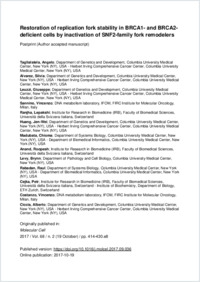Restoration of replication fork stability in BRCA1- and BRCA2-deficient cells by inactivation of SNF2-family fork remodelers
- Taglialatela, Angelo Department of Genetics and Development, Columbia University Medical Center, New York (NY), USA - Herbert Irving Comprehensive Cancer Center, Columbia University Medical Center, New York (NY), USA
- Alvarez, Silvia Department of Genetics and Development, Columbia University Medical Center, New York (NY), USA - Herbert Irving Comprehensive Cancer Center, Columbia University Medical Center, New York (NY), USA
- Leuzzi, Giuseppe Department of Genetics and Development, Columbia University Medical Center, New York (NY), USA - Herbert Irving Comprehensive Cancer Center, Columbia University Medical Center, New York (NY), USA
- Sannino, Vincenzo DNA metabolism laboratory, IFOM, FIRC Institute for Molecular Oncology, Milan, Italy
- Ranjha, Lepakshi Institute for Research in Biomedicine (IRB), Faculty of Biomedical Sciences, Università della Svizzera italiana, Switzerland
- Huang, Jen-Wei Department of Genetics and Development, Columbia University Medical Center, New York (NY), USA - Herbert Irving Comprehensive Cancer Center, Columbia University Medical Center, New York (NY), USA
- Madubata, Chioma Department of Systems Biology, Columbia University Medical Center, New York (NY), USA - Department of Biomedical Informatics, Columbia University Medical Center, New York (NY), USA
- Anand, Roopesh Institute for Research in Biomedicine (IRB), Faculty of Biomedical Sciences, Università della Svizzera italiana, Switzerland
- Levy, Brynn Department of Pathology and Cell Biology, Columbia University Medical Center, New York (NY), USA
- Rabadan, Raul Department of Systems Biology, Columbia University Medical Center, New York (NY), USA - Department of Biomedical Informatics, Columbia University Medical Center, New York (NY), USA
- Cejka, Petr Institute for Research in Biomedicine (IRB), Faculty of Biomedical Sciences, Università della Svizzera italiana, Switzerland - Institute of Biochemistry, Department of Biology, ETH Zurich, Switzerland
- Costanzo, Vincenzo DNA metabolism laboratory, IFOM, FIRC Institute for Molecular Oncology, Milan, Italy
- Ciccia, Alberto Department of Genetics and Development, Columbia University Medical Center, New York (NY), USA - Herbert Irving Comprehensive Cancer Center, Columbia University Medical Center, New York (NY), USA
-
19.10.2017
Published in:
- Molecular Cell. - 2017, vol. 68, no. 2, p. 414-430.e8
DNA replication stress
Replication fork instability
Replication fork reversal
BRCA1 and BRCA2
RAD51
SMARCAL1
ZRANB3
HLTF
MRE11
Breast and ovarian cancer
English
To ensure the completion of DNA replication and maintenance of genome integrity, DNA repair factors protect stalled replication forks upon replication stress. Previous studies have identified a critical role for the tumor suppressors BRCA1 and BRCA2 in preventing the degradation of nascent DNA by the MRE11 nuclease after replication stress. Here we show that depletion of SMARCAL1, a SNF2-family DNA translocase that remodels stalled forks, restores replication fork stability and reduces the formation of replication stress-induced DNA breaks and chromosomal aberrations in BRCA1/2-deficient cells. In addition to SMARCAL1, other SNF2-family fork remodelers, including ZRANB3 and HLTF, cause nascent DNA degradation and genomic instability in BRCA1/2-deficient cells upon replication stress. Our observations indicate that nascent DNA degradation in BRCA1/2-deficient cells occurs as a consequence of MRE11-dependent nucleolytic processing of reversed forks generated by fork remodelers. These studies provide mechanistic insights into the processes that cause genome instability in BRCA1/2- deficient cells.
- Language
-
- English
- Classification
- Biology, life sciences
- License
-
License undefined
- Open access status
- green
- Identifiers
-
- RERO DOC 326636
- DOI 10.1016/j.molcel.2017.09.036
- ARK ark:/12658/srd1319052
- Persistent URL
- https://n2t.net/ark:/12658/srd1319052
Statistics
Document views: 192
File downloads:
- Fulltext: 303
